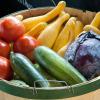
The SWITCH ambition is to accelerate the behavioral shifts of European citizens towards more sustainable and healthy models through research and innovation as a driver to increase knowledge and strategies supporting policy makers and all the actors involved in this mission. SWITCH provides the opportunity to engage all agri-food systems actors in a process of knowledge sharing and co-creation.
In practice, the SWITCH project encourages EU citizens to adopt sustainable and healthy diets by changing the way food is being produced and consumed. This is done with a combination of technologies, social initiatives, and innovations supporting sustainable food systems. The project is implemented in real-life conditions in selected Food Hubs, to scale up best practices all over Europe.
WP7 - EU scenario of food dietary patterns and environmental and socio-economic shifts
In this project, IIASA integrates a suite of advanced tools and models to address specific questions and develop scenarios at the EU level, building upon results from local to national and continental scales. This approach provides a comprehensive sustainability assessment of upscaling dietary scenarios in the EU based on healthy diets/systems identified in the regional case studies, considering the diverse food demands of different population groups. The AFE team will use the biophysical modelling framework EPIC-IIASA to improve the representation of field vegetable production systems for EU countries in GLOBIOM. Thanks to this improved representation of supply side capturing important components of healthy diets, impacts of the dietary shifts on selected socioeconomic metrics in agriculture will be implemented.
An important outcome of the model scenarios is to provide a robust framework of trajectories of potential impacts of dietary shifts, assessing the potential trade-offs and co-benefits with impacts on health, socio-economic outcomes, greenhouse gas emissions and mitigation potentials of the agri-food sector. The integrated modelling toolbox will provide a “systemic approach” to assess the expected and actual impacts, co-benefits and trade-offs with regards to the three pillars of sustainability (health, climate/environmental and economic), primarily basing on the EU Green Deal objectives.
Key Objectives:
- Assessing potential trade-offs and co-benefits on health, socio-economic outcomes, greenhouse gas emissions, and mitigation potentials of the agri-food sector.
- Utilizing an integrated modeling toolbox to evaluate expected and actual impacts, co-benefits, and trade-offs concerning the three pillars of sustainability: health, climate/environmental, and economic.
- Aligning efforts with the EU Green Deal objectives.
Partners:
| Centro Euro-Mediterraneo sui Cambiamenti Climatici (CEMCC) | Italy |
| Future Food Institute | Italy |
| International Institute for Applied Systems Analysis (IIASA) | Austria |
| EPFL+ECAL Lab | Switzerland |
| pOsti | Italy |
| University of Madrid - UPM | Spain |
| UNINA – Federico II University | Italy |
| University of Campania Luigi Vanvitelli | Italy |
| Wageningen University and Research | Netherlands |
| Leibniz Centre for Agricultural Landscape Research (ZALF) | Germany |
| Chalmers University of Technology | Sweden |
| Basque Centre for Climate Change (BS3) | Spain |
| Antistatique | France |
SWITCH - Project Number: 101060483
Call: HORIZON-CL6-2021-FARM2FORK-01-15: Transition to sustainable and healthy dietary behaviour
Funded by the European Union. Views and opinions expressed are however those of the author(s) only and do not necessarily reflect those of the European Union. Neither the European Union nor the granting authority can be held responsible for them.

